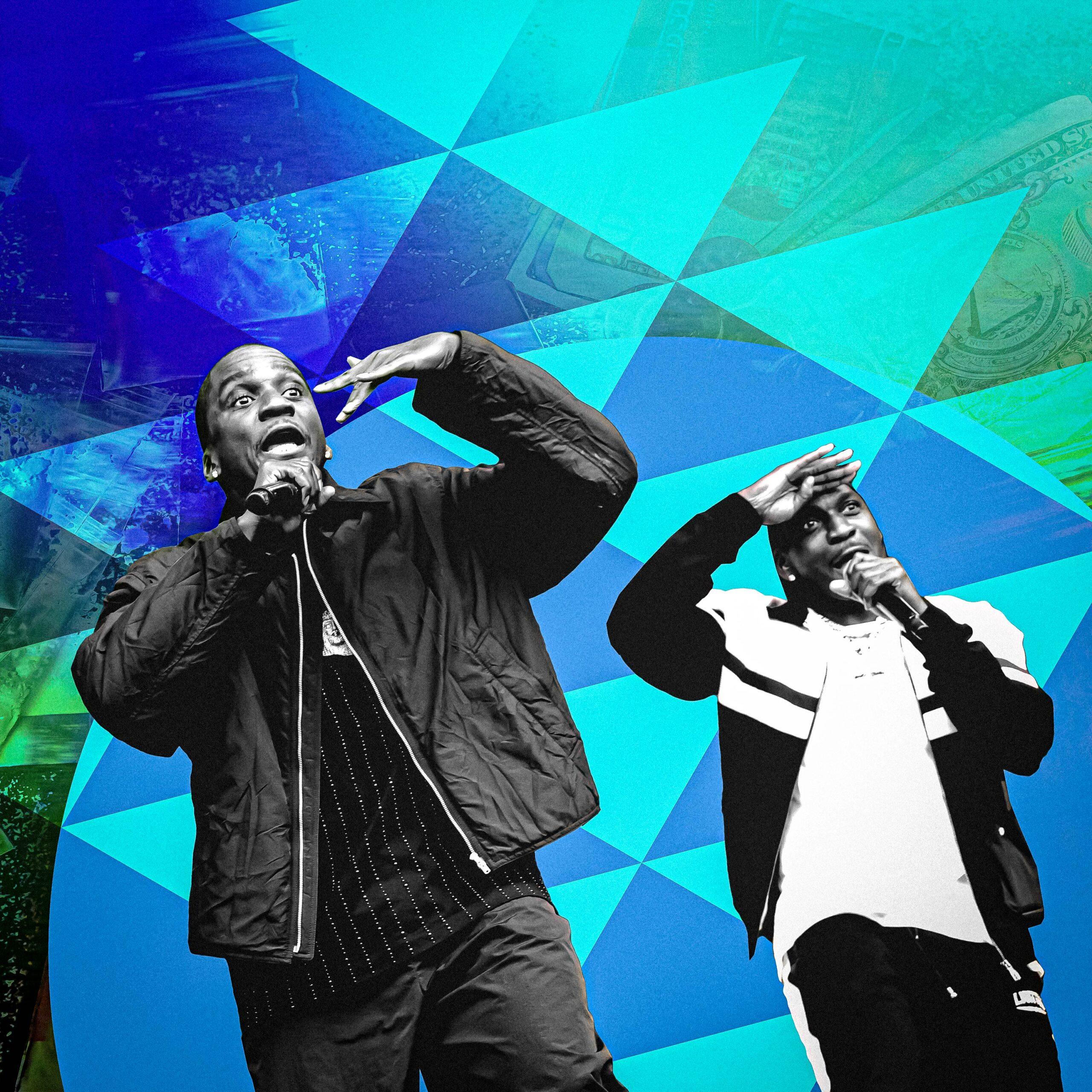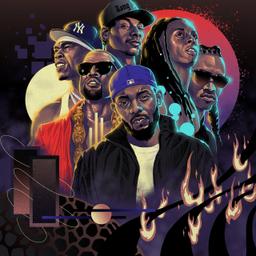
Across their decades of high-art hustling as the seminal rap duo Clipse, my new favorite feat realized by the brothers Gene “Malice” and Terrence “Pusha T” Thornton is that they managed to get both Hov and a bunch of Parisians to vibe on camera to the same song in two of the past three summers. This is a peculiar honor for a pair of microphone kingpins and also a symptom of their sometimes-Sisyphean struggle: The track, called “Chains & Whips,” debuted in June 2023 at the annual Louis Vuitton summer/spring runway show in anticipation of a reunion album that sat completed but unreleased for years. Because we’re talking about Pusha T and Malice, there’s a healthy dose of record label duncery and artistic resolve involved in the stalled launch. (More on that later.)
A sinister, organ-filled, bass-heavy affair, “Chains & Whips” was constructed by the duo’s longtime producer, multi-hyphenate mogul Pharrell Williams, in between responsibilities for his current day job at the aforementioned French fashion house. (It’s worth noting, too, that it was forged at the very moment when a social media discourse was occurring about whether this was the beatmaker’s Shaq-in-Celtic-green era, and when his rivals were bidding to melt down his old neckwear.) And when Jigga initially heard the song back in 2023, his brow visibly furrowed, a reaction caught on a livestream as he sat next to the Carter family’s primary wage earner. A few weeks ago a similar reflex spread throughout a rooftop crowd of MCs and genteel fashion heads while Pharrell unfurled additional vocals for the track, this time from a Buick-cruising Angeleno named Kendrick Lamar. Much has changed in the 15 years since Malice found god and left Pusha to sharpen his rep as a god-MC reaper, but the potency of the group’s concoctions has not tapered.
All of which is to say that there’s an impending holiday on the horizon for those partial to rap philosophies about glocks and keys: On July 11, Clipse will finally release Let God Sort Em Out, their fourth album and the follow-up to 2009’s Til the Casket Drops. It’ll be the first record to be produced entirely by Pharrell for the duo or Pusha since he helmed the 2006 kilo-gothic masterpiece Hell Hath No Fury (possibly by himself). In the year since the new album’s initial announcement, both Thornton brothers have said they resisted censorship attempts by Def Jam and UMG—their old label and distributor—who were skittish about the appearance of another confrontation, aided again by Lamar, with a certain discontent pop star up north. (Push and Malice disputed that any of Let God Sort Em Out’s lyrics were even aimed at Drake, and eventually got released from their contract for a reported seven-figure sum.)
None of this is, exactly, easing back onto the stage. The nature of Clipse’s return, their apparent sound, and their enduring style belie the difficulty of what they’re primed to do.
An old-head renaissance has been afoot, for a minute, in all corners of hip-hop: partly environmental and partly personal. Having whole catalogs available at the push of a button tends to mow down most of the barriers to entry for fans. Add to that the growth of independent rap labels, direct-to-consumer marketing apparatuses, a growing generation of middle-aged hip-hop heads, and expansions in merch and touring ventures, and the incentives for established comeback acts are increasingly enticing enough for those artists to cut short a sabbatical or retirement. Clipse’s reunification isn’t necessarily groundbreaking in this way, but it is the latest in a wave of returns and perhaps the most challenging. In the past 12 months alone, comeback albums from Slick Rick, Redman, Wu-Tang Clan, Dr. Dre and Snoop Dogg, and LL Cool J, each of which hearkens back to their cultural zenith, have all dropped to varying degrees of critical and commercial success.
The two most analogous comparisons to Let God Sort Em Out in the past decade are probably Yasiin Bey and Talib Kweli’s Madlib-produced, Black Star revival No Fear of Time and A Tribe Called Quest’s celestial triumph, We Got It From Here… Thank You 4 Your Service, at least in that both of them resemble a flavor of contemporary records while maintaining an abiding familiarity. In both cases, though, the audience for each project was a little bit older, and a little less online—to say nothing of the difference in the groups’ scopes, stylistic leanings, and immediate circumstances. (The Black Star record was initially only made available on the premium podcast app Luminary; Phife Dawg passed a full eight months before Tribe dropped.) On a granular level, what makes Clipse’s return so distinct is that there’s a case to be made that each of the central stakeholders involved in the project has staved off decline as a craftsman, and one of them might even be more popular than ever.
“Ace Trumpets,” a kaleidoscopic mirage of synths and plucked acoustic chords released in late May, bumps and lulls listeners like it hopped straight out of Pharrell’s twisted Hell Hath dreamscape. Both Push and Malice revel in the pockets the bass line provides them with, each MC still palpably infatuated with the competition of rhyming. (“White glove service with the brick, I am Luigi,” Pusha gloats early on in an artfully symmetrical opening verse, a gaudy centerpiece until Malice crows, “Over half a mil’ we call focaccia,” in a Hampton Roads drawl.) “So Be It”—with its Near East string sample, incantory Arabic vocal flair, shuffling percussives, and cardiac arrest drum pattern—is as spare, teeming, and timeless as anything the fashion mogul, Williams, has constructed in decades. Lyrically, it’s a tune that manages to meld Pusha’s classicist aspirations and coke rap aesthetics while prodding Malice to stitch a web of couplets, his preferred mental game within a game.
Both brothers remain messy in their ambitions (see: Push’s much-ballyhood Travis Scott digs) but with enough emotional variance to leave a residue of regret beneath the bragadocio. “The Birds Don’t Sing”—a pair of verses-in-a-bottle to their deceased parents that premiered on last year’s runway—is a notable departure from their pattern of album openers that tend to herald the duo’s journey from crack to rap to back to selling it pure. With Push 48 and Malice 52, having lives and families of their own, it doesn’t take a shrink to interpret this recent work as anything other than a love letter to the genre and form the crew fell in love with.
Depending on how much you take their word as gospel, Clipse has always tended toward a reverence for the craft: “All that we want from this rap game is the ability to provide our families, to scoop our peoples off the street and make this music that we love,” Pusha told XXL back in 2002. Pharrell—who grew up with both MCs (and was recently engaged in a legal dispute with his former Neptunes copilot, Chad Hugo)—likewise has no reason to be making album cuts in between international runways and corporate meetings other than sheer infatuation with the art form. Let God Sort Em Out was reportedly made from his office overlooking the Seine in Paris—Pusha and Malice making pilgrimages to and from Europe until the portrait was complete.
They tried to dodge nostalgia. The goal of both the brothers and the producer was to elicit a similar feeling as their favorite creations. “How do we evoke that feeling?” Pusha told GQ in May. “It’s always about really trying to dial into the emotion of the song.” In an era of album devaluation and tracklist bloat, the collective chased after a complete, detailed work. “These are movies, man,” Pusha told Vulture last year. “These aren’t just songs. This isn’t just a collection of joints we went in and banged out.” Clipse have never been creative shut-ins. Back when I talked to Pusha while he was promoting his last solo album, he told me evolving as an artist meant always being open to new “sounds,” if not subjects. “It means that the art, the sound that I’m making always sounds progressive,” he said, tellingly. “It can have the same content, it can have the same subject matter. … But it needs to look and be fresh every time.”
That’s quite the task in a genre where deities fall in clusters. Rap has the particular distinction, native to all modes of Black artistic expression, of being culled prematurely. It also maintains the occasional blessing, native to modernity, of hanging around far longer than it used to. For every Pop Smoke or Gangsta Boo, there’s a Black Thought still chipping away at the work. (Give Matisse a few more canvases and watch what he does with them, despite the circumstances.) Maybe Let God Sort Em Out goes no. 1 on the charts like Pusha’s last joint—lord knows he’s stirring the pot vigorously enough to induce some traction. Maybe it’ll be the first release in a line of new projects from both Thornton brothers on their own terms with a label they finally trust. Maybe it’ll dead all that slander fluttering around the more grass-deprived corners of the internet saying rap’s skateboard Quincy has lost a step. In this trade, the hustle counts. And Clipse doesn’t seem to have lost either the audacity or the capacity to serve it up.




